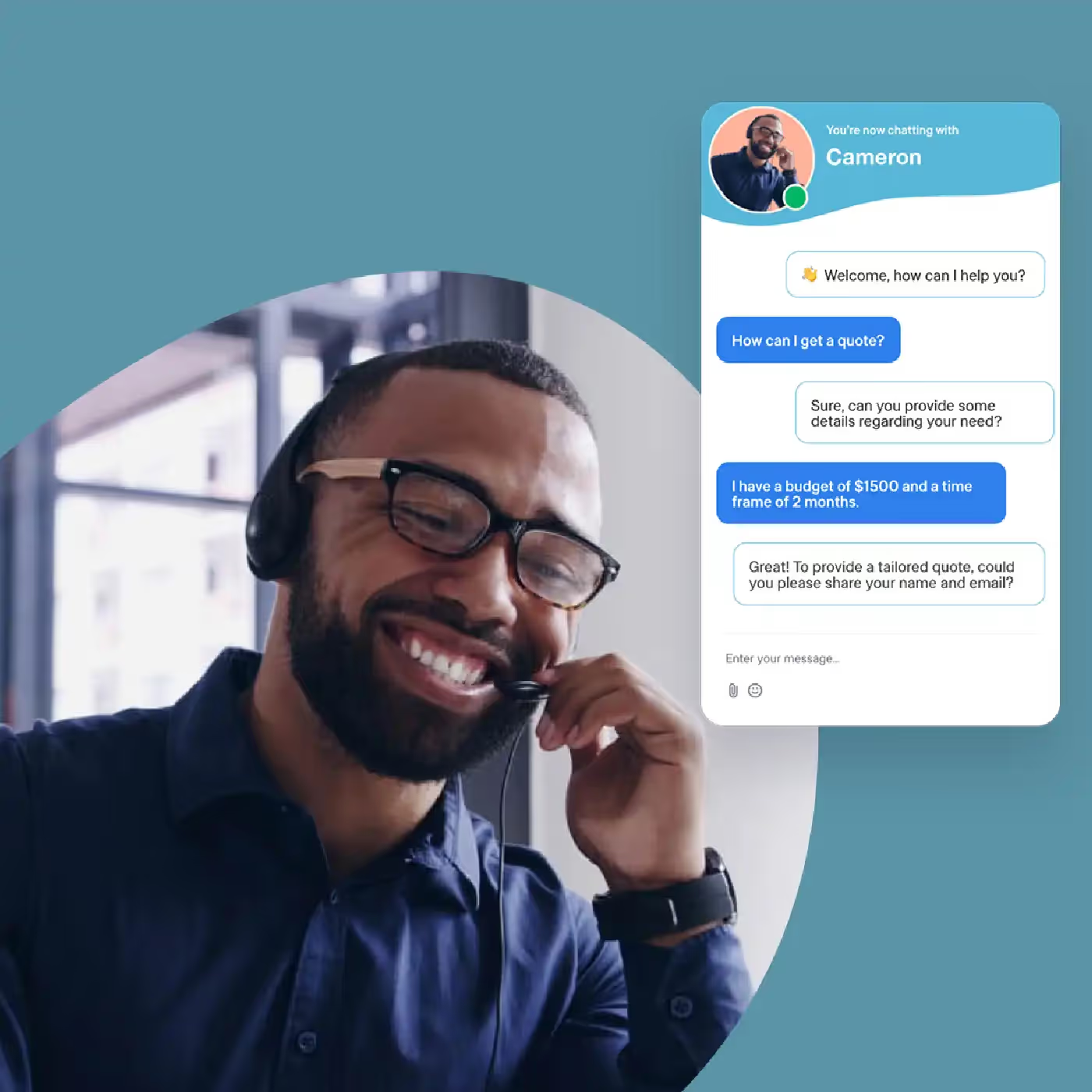Analysis Of The Pros and Cons of AI in Customer Service
Analysis Of The Pros and Cons of AI in Customer Service

AI is rewriting the playbook for customer support. You've probably noticed chat widgets that answer questions in seconds or voicebots that pick up the phone after one ring. That shift is accelerating. Gartner projects that by 2027, chatbots will be the primary service channel for nearly a quarter of organizations.
Yet headlines about "fully automated customer service" often skip the messy middle. Many buyers still crave the human touch, and some customers prefer to deal with human agents for complex issues. Setting clear, data-driven goals matters more than chasing buzzwords. Think of AI as a powerful tool that extends your team's reach but still needs skilled people to handle edge cases.
This guide cuts through the hype with a balanced look at AI in customer service, backed by research and practical examples, including Smith.ai's hybrid approach.
The Pros of AI in Customer Service
AI technology brings a multitude of advantages to customer service, enabling businesses to enhance their operations and meet evolving customer expectations.
Deliver 24/7 Availability for Immediate Customer Needs
Unlike human agents, AI-powered systems operate around the clock without scheduling constraints. This ensures customers receive assistance anytime they need it, eliminating wait times and meeting modern demands for immediate service.
Reduce Costs While Maximizing Human Agent Value
Utilizing AI for customer service tasks reduces the need for a large workforce, resulting in significant savings on recruitment, training, and retention costs. AI handles routine inquiries, enabling human agents to focus on complex issues without being bogged down by repetitive tasks. This deflection cuts labor costs, freeing resources for strategic business priorities.
Scale Effortlessly During Peak Customer Demand
AI systems manage multiple interactions simultaneously, accommodating spikes in customer inquiries without proportional increases in resources or costs. This agility eliminates long call queues and busy signals, providing a seamless customer experience. Research indicates AI can handle up to 80% of routine customer queries without human intervention.
Integrate Seamlessly With Your Existing Business Tools
AI technology excels at connecting with CRM systems, knowledge bases, and other essential business tools. This integration supports effective data synchronization and workflow automation, streamlining operations across your business. A comprehensive understanding of customer interactions enables personalized service and fosters stronger relationships.
Filter Low-Value Contacts to Prioritize Critical Cases
AI enhances efficiency by intelligently screening calls and chats, filtering out spam and low-priority inquiries, allowing human agents to focus on high-impact, critical cases. By prioritizing inquiries based on their urgency and importance, businesses can optimize their human resources and reduce bottlenecks.
Leverage Customer Data for Personalized Experiences
AI systems analyze substantial amounts of customer data and transaction histories in real-time, producing insights that guide better decision-making and foster personalized experiences. Notably, studies indicate that customers increasingly expect personalized interactions, underscoring the growing importance of this capability.
The Cons of AI in Customer Service
AI call handling is powerful, but it isn't a magic switch. Several pain points can put your budget, compliance posture, and customer experience at risk if not properly addressed.
Manage Expectations Around Revenue and Conversion Claims
Some vendors imply that every missed call equals a lost sale and that an AI phone receptionist will suddenly double conversion rates. This narrative overlooks real-world variables, such as lead quality, buying cycles, and industry averages, resulting in plans based on inflated revenue projections rather than trustworthy data.
Plan for Variable Costs That Can Fluctuate Seasonally
Most platforms are priced by interaction volume; a quiet month can feel like a bargain, but a seasonal spike can trigger steep overage fees that blow up your cost forecast. Since call traffic isn't always predictable, what's labeled "automation savings" can quickly become "unplanned expense."
Budget Time for Ongoing Training and System Maintenance
An AI voice assistant only sounds "smart" after you feed it clean, representative data and continuously refine its model, a time-intensive process that stretches beyond initial onboarding. Ongoing tuning consumes staff hours you might have earmarked for other projects.
Prepare for AI's Limitations With Emotional or Complex Cases
Even with diligent training, automated systems stumble on context-rich or emotionally charged conversations. They often misread sarcasm or nuance and default to generic replies, which can drive customer frustration. Many buyers prefer human empathy, especially for sensitive matters where a robotic tone can erode trust.
Implement Redundancy for Technical Dependencies
AI receptionists rely on stable internet connections and cloud uptime; an outage leaves you without a fallback unless you've invested in redundant systems and clear contingency protocols.
None of these drawbacks are deal-breakers, but they are deal-definers. Weigh them carefully so the promise of automation translates into durable gains rather than expensive lessons.
Making the Right Customer Service Decision for Your Business
Choosing the right customer service option for your business is a crucial decision that requires thoughtful consideration. Here are key factors to consider to ensure a successful integration of AI technology into your call management strategy:
- Analyze Current Call Volume: Review last quarter's logs to identify peak times and types of calls received.
- Prepare for Seasonal Demand: Choose an AI solution that can scale flexibly without exceeding your budget during busy periods.
- Ensure Compliance: Verify that any vendor you consider can meet your industry’s compliance requirements, especially if you operate in a regulated sector.
- Ask Critical Questions: Determine what percentage of calls require human empathy or complex judgment and how the AI system will manage these situations.
- Evaluate Support Expectations: Assess whether your customers need 24/7 support or if extended business hours are sufficient for your operations.
- Check CRM Integration: Confirm that the platform can seamlessly connect with your CRM to ensure conversation details flow into client records automatically.
- Understand Data Handling: Investigate how the vendor addresses GDPR or similar regulations regarding data retention and deletion.
- Set Measurable Goals: Focus on tracking operational metrics, such as the percentage of calls resolved automatically, those remaining within the AI system, and customer satisfaction scores, rather than unrealistic revenue promises.
- Compare Provider Offerings: Look for transparent pricing based on call volume, documented processes for transitioning between AI and human agents, and compatibility with your existing tools and systems.
- Consider a Hybrid Approach: Explore solutions like the AI Receptionist from Smith.ai, which combines 24/7 automation with human support to prevent frustrating dead ends for callers.
- Plan for Successful Implementation: Establish realistic timelines, create backup procedures for potential issues, and allocate time for staff training and system fine-tuning. With clear objectives and the right partner, you can effectively leverage AI without compromising the customer experience.
Why Smith.ai Stands Out in AI Customer Service
Smith.ai distinguishes itself through a unique approach that addresses the limitations of fully automated systems while maximizing their benefits. By combining cutting-edge AI technology with human expertise, Smith.ai has developed a solution that delivers both efficiency and the authentic personal connection customers value.
Here's how their distinctive model transforms typical customer service challenges into competitive advantages:
- Rapid Implementation: When time is critical, the AI Receptionist deploys in just 15 minutes through a user-friendly web wizard, with live specialists available to address any setup challenges. This quick-start approach combines DIY convenience with expert support for a one-time setup fee.
- Hybrid AI-Human Model: The core strength of Smith.ai lies in its dual approach: AI handles initial interactions while human receptionists seamlessly take over when situations require empathy or complex judgment. This smart handoff system delivers automation efficiency without sacrificing the personal touch.
- Quality-Focused System: Human agents undergo continuous coaching while interactions feed a learning loop that trains the AI. Real-time contextual data enables personalized responses that adapt to each caller's needs rather than following rigid scripts.
- Predictable Pricing: Unlike unpredictable per-minute billing, Smith.ai offers transparent, tiered plans based on call volume with clear upgrade paths and overage fees, making budget forecasting straightforward.
- Seamless Integration: The platform connects directly with popular business tools, including CRMs, call-tracking platforms, and calendaring systems, enabling automatic data synchronization and streamlined workflows.
- Reliable Service: With 24/7 availability, spam filtering, and consistent customer experience regardless of team location, Smith.ai provides dependable support backed by realistic promises focused on measurable outcomes rather than inflated projections.
Finding Your AI-Human Balance in Customer Service
AI-powered tools deliver the always-on support customers expect, cutting wait times and operational costs with round-the-clock coverage. But the same technology struggles with nuanced, emotionally charged issues, a reality that requires realistic expectations.
Transparency makes the difference. When providers clearly outline pricing, integration scope, and compliance boundaries upfront, you can budget accurately and avoid surprises.
The AI Receptionist combines machine efficiency with human empathy through dynamic escalation, delivering practical business outcomes without overpromising.
If you're ready to define clear goals and see whether a hybrid human-AI system fits your workflow, schedule a quick consultation with Smith.ai to find out.
Take the faster path to growth. Get Smith.ai today.
Key Areas to Explore

Your submission has been received!












.svg)



